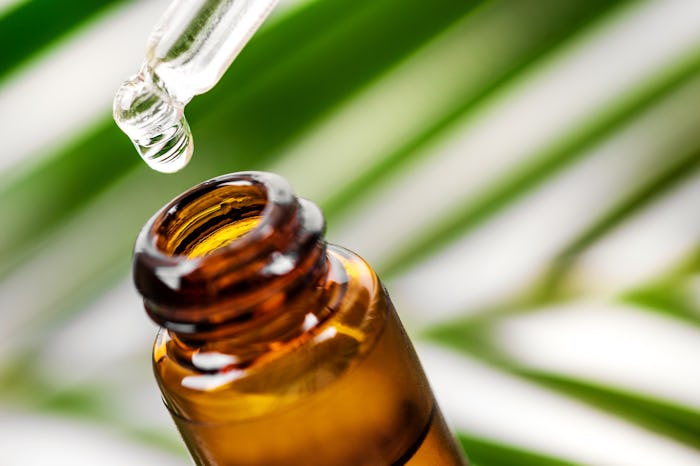Life

OK, Here's The Actual Science Behind Essential Oils & Preventing Tears During Birth
Anyone who has ever had a baby vaginally can tell you how pushing out a human affects "down there." I am pretty sure my son actually designed his own exit out of my body, perhaps with a tiny hacksaw he somehow smuggled into my uterus. (At least that's how it felt.) Getting relief from that pain wasn't easy, and I wasn't wholly successful. Since I have many friends who swear by essential oils for everything, claiming they work for anything from the common cold to a muscle injury, it makes me wonder, is there an essential oil for perineal tears? Could they treat or even prevent them?
The jury is out on scientific evidence for the use of essential oils for most applications — perineal injury included. The perineum, the section of skin between the vaginal opening and the anus, can suffer pretty severely in the course of labor. Recently, as the oils become more popular, there have been several studies looking into specific essential oils for perineal tears, notably the study published in The Journal of Maternal-Fetal & Neonatal Medicine. This study examined the use of popular oils — lavender and almond — that are used all over the world in the prevention of perineal tears. Researchers concluded that "the type of the oil used during the second stage of labor for prevention of perineal tears has no effect on the integrity of the perineum. Accordingly, it seems that there is no perfect oil."
However, many midwives, doulas, and moms swear by the usage of essential oils in both the prevention of tears to the perineum and for treating those tears after birth. In a simple shout-out in a Facebook group that I was added to a few months ago (you know the type — the one that sells all the oils and leggings), I asked if anyone recommended an oil for perineal tears and I got 40 responses in 15 minutes. Hot dang, people are really into massaging their perineum. Honestly? I'm here for it. Yes, it's absolutely anecdotal evidence, but if it's not harming you, what's wrong with trying?
These ladies, many of whom do sell essential oils, swear by the use of lavender and arnica in the postpartum period to help ease the pain and swelling of the perineal tears. They were very specific in how to use it, and pro-essential oil birthing sites agree: don't apply any essential oil directly to your body. Instead, add a few drops to your bath, or by using an infused gel. It needs to be extremely diluted.
As for the prevention of perineal tears, many labor professionals support the use of perineal massage in the days and weeks leading up to labor. The gold standard oil used in this practice is sweet almond oil, according to Birthing Basics. Sweet almond oil is not a true essential oil, which is a condensed, highly potent form of the plant it is made from. Sweet almond oil is more like avocado or canola oil in its preparation. The website mentioned that the neutrality of the oil is important.
It should also be noted that while it's not standard accepted practice in Western medicine, women across the Middle East and Asia have used lavender oil for centuries to relieve pain post-childbirth, and they have some research to support it. One Korean study found that the "findings indicate that postpartum aromatherapy for perineal care could be effective in healing the perineum." Specifically, they looked at women who used oils "applied as sitz bath or soap application" using "lavender, myrrh, neroli, rose, grapefruit, mandarin, orange, and Roman chamomile."
You should always talk to your provider as to the safety of these oils, but more and more doctors and midwives are embracing their use in their practice. It's worth a try, right?